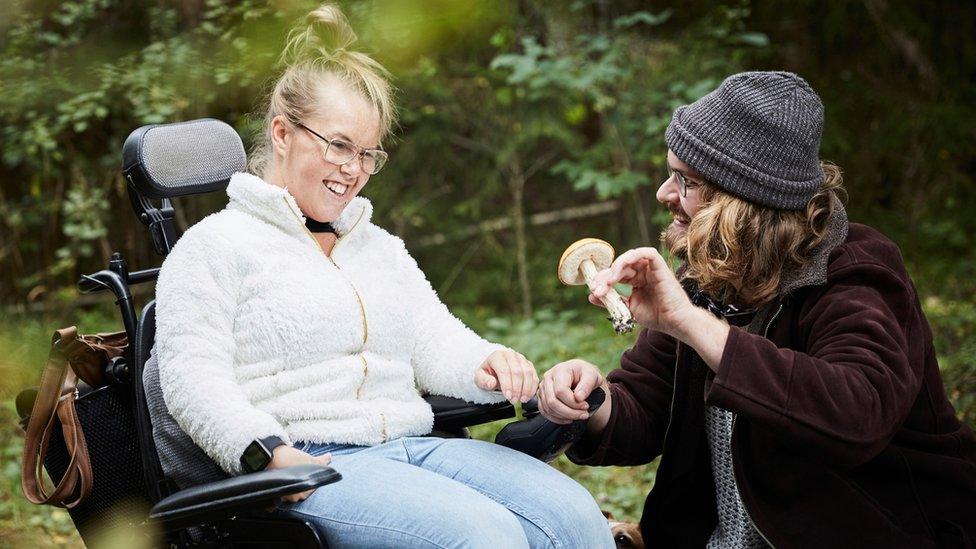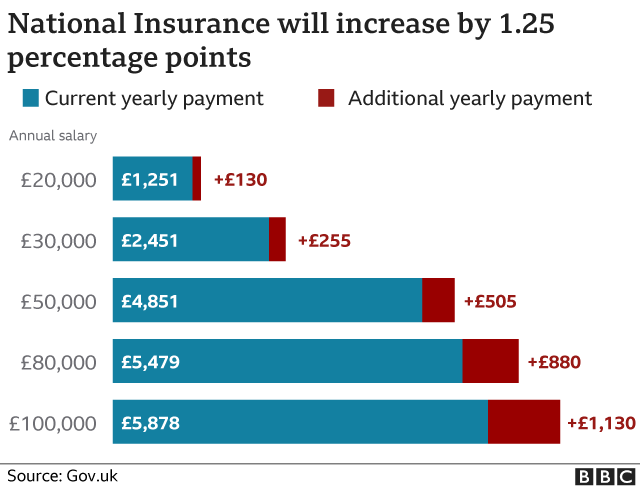Minister defends social care bill reform wait
- Published
- comments

Care Minister Helen Whately has admitted that putting into effect the cap on social care costs is "a little way off" but said it is a "big reform that takes time to implement".
MPs last night voted to approve a rise in National Insurance to help fund health and social care.
It limits care bills faced by people in England to £86,000 from October 2023.
But critics say the system is in crisis now and most of the funding will be swallowed up by the NHS.
MPs voted by 319 to 248 for a 1.25 percentage point rise in National Insurance next year for both workers and employers, to help deal with the crisis in health and social care as the UK emerges from the pandemic.
In 2023, National Insurance will return to its previous level and the tax increase will become a separate health and social care levy on earnings.

The measures will raise an extra £12bn a year over three years and the prime minister has said the majority of the £36bn fund will go towards dealing with the waiting list backlog in the NHS which has reached a record high.
Around 15% of the money - £5.4bn in total - will go towards changes to the social care system, with more promised after that.
But there are fears that the demands on the money from the health service will continue, and not enough funding will be left to tackle the growing problems in social care.
The draft legislation for the new Health and Social Care Levy shows how the money raised will be legally ringfenced to be spent on health and social care, but gives the Treasury the power to decide the split.
This is likely to reinforce fears amongst MPs that the funds will be monopolised by the health service and never reach the care sector.
In the Commons on Wednesday, Conservative Jake Berry said he was "very concerned that this tax is not really a health and social care tax, it's actually a Trojan horse for an NHS tax".
Peace of mind
Speaking on BBC Breakfast, Ms Whately denied it was a possibility that social care could lose out.
She said ministers had "seized" the challenge after successive government had talked for decades about overhauling the system but had failed to get reforms through.
She said some of the extra funding would start going in to social care from April 2022, but the new cap on costs, that ensures no-one in England will have to pay more than £86,000 - not including food or accommodation - will not take effect until 18 months later.
She praised the measure, which only applies to new claimants from October 2023 and not those already in the system, as a way to give people "peace of mind".
She said: "This big policy to put in place a cap on the amount that you might face for the cost of your care, that does simply take time to implement.
"We can't turn it on tomorrow.
"We will turn it on as soon as we can and that will then give people the peace of mind that they won't face those huge care bills that some face at the minute."
Labour says the government has broken its promise that people will not have to sell their home in order to pay for the help they need.
Speaking in the debate on Tuesday evening, Labour's shadow chancellor Rachel Reeves said under Mr Johnson's plan "someone with a house worth £186,000 would still have to pay £86,000 even with this cap - and that's before living costs of going into a care home."
"How does the chancellor suggest they pay those fees without selling their home?" she asked.

Do you or a loved one require social care? How will the new tax affect you? Email haveyoursay@bbc.co.uk, external.
Please include a contact number if you are willing to speak to a BBC journalist. You can also get in touch in the following ways:
WhatsApp: +44 7756 165803
Tweet: @BBC_HaveYourSay, external
Please read our terms & conditions and privacy policy
If you are reading this page and can't see the form you will need to visit the mobile version of the BBC website to submit your question or comment or you can email us at HaveYourSay@bbc.co.uk, external. Please include your name, age and location with any submission.


THE GREATEST PHARAOH: Who was Ramesses The Great and why was he beloved?
IS CHOCOLATE GOOD FOR YOU?: Why eating a small amount of dark chocolate can be healthy
